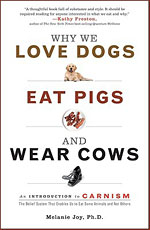Melanie Joy is a social psychologist and professor of psychology and sociology at the University of Massachusetts, Boston. She has written numerous articles on animal rights and is the author of the activist handbook Strategic Action for Animals. In this cogent and unsettling work, Joy challenges us to revise our ideas, prejudices, and habits of eating animal-based foods. What is carnism? She defines it this way:
"We don't see meat eating as we do vegetarianism — as a choice, based on a set of assumptions about animals, our world, and ourselves. Rather, we see it as a given, the 'natural' thing to do, the way things have always been and the way things always will be. We eat animals without thinking about what we are doing and why because the belief system that underlies this behavior is invisible. This invisible belief system is what I call carnism."
Most of us are carnists, because we eat meat not because we need to, but because we choose to. What lies behind our meat-eating culture? The U.S. Department of Agriculture (USDA) estimates that the average American consumes 87 pounds of chicken, 17 pounds of turkey, 66 pounds of beef, and 51 pounds of pork per year. Add to this a pound of veal and a pound of lamb, and each of us eats a total of 223 pounds of meat annually. Even more astonishing is that U.S. agribusinesses slaughter ten billion animals per year, and that's not including the estimated ten billion fish and other sea animals that are killed annually. That's 19,001 animals per minute, or 317 animals per second. Sobering facts to keep in mind.
Joy begins this book with a quotation by Mahatma Gandhi: "The greatness of a nation and its moral progress can be judged by the way its animals are treated." The author summarizes many of the grim and inhumane practices of factory farms that treat chickens, cows, pigs, and other animals shamefully in order to cut costs. A significant body of scientific research shows that these creatures, and also fish, possess both intelligence and the capacity to feel pain. Sir Paul McCartney once claimed that if slaughterhouses had glass walls, everyone would be vegetarian. After reading this book or seeing the hard-hitting documentary Food, Inc., perhaps many will choose to make different choices.
Meanwhile, it is business as usual with the agribusinesses and factory farms treating all animals as commodities or as "collateral damage" in the great American eat-a-thon. Joy believes it is time to challenge carnism and to become a more compassionate society in terms of the way we treat animals. Bearing witness to their suffering like she has done is a good place to start.
